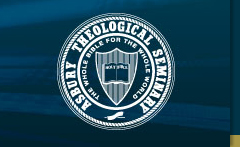
CD 610 Moral Development
The student showing competence in this course will be able to: 1. Examine the human sciences enterprise from a Wesleyan theological perspective including issues of epistemology, the naturalistic fallacy, and claims for “truth.” 2. Discuss the interaction of biological, cognitive, affective, moral and faith components that contribute to moral development across the lifespan. 3. Articulate predominant moral developmental perspectives and consider their presuppositions and implications for moral judgment, religious education, and other dimensions of ministry. 4. Formulate questions and dialogue regarding the relationship of human development issues and the theological doctrines of creation, sin, the nature of human beings, redemption, and grace. 5. Distinguish between different conceptualizations of justice and relate these to Biblical revelation. 6. Identify probable gender differences and racial differences in moral reasoning and their implications for ministry. 7. Reconstruct from their own experience personal transitions and movements through stages of development with a view toward embracing the whole of God’s redemptive pattern. 8. Commit to ministry applications that are sensitive and responsive to the appropriate developmental level of the individuals in one’s target population. 9. Understand suffering and pain as important mechanisms for transformation and articulate a theology that accounts for and comprehends their significance. Old URL: http://ecommons.asburyseminary.edu/xmlui/handle/10910/9075
Summary
James C. Wilhoit and John M. Dettoni. Nurture that is Christian: Developmental Perspectives on Christian Education. Wheaton: Victor Books, 1995. James Fowler. Faithful Change: The Personal and Public Challenges of Postmodern Life. Nashville: Abingdon Press, 1996. E Stanley Jones, The Christ of the Mount. Hardwired to Connect: The New Scientific Case for Authoritative Communities (From the Institute of American Values www.americanvalues.org) Choose one from the following: (I recommend The Great Divorce for this class, but I am open to these other substitutions if they sound more appealing) C.S. Lewis. The Abolition of Man C.S. Lewis. The Great Divorce Walter Wangerin. The Orphean Passages (Available only in manuscript form from the bookstore)
